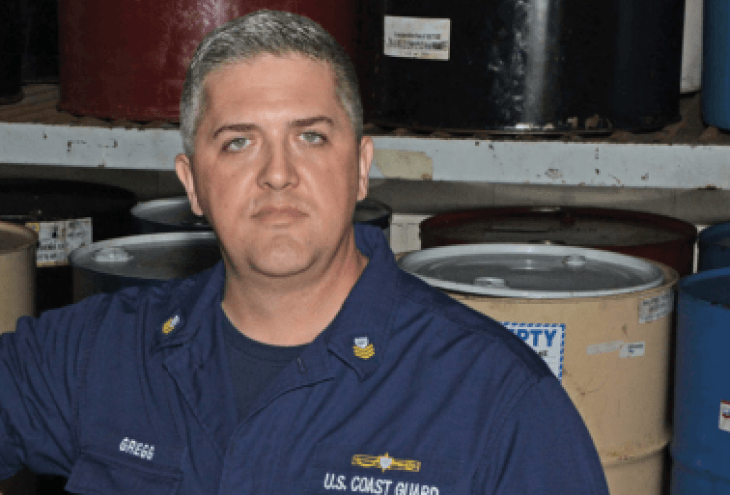The heart of Jeff Gregg’s work is vigilance. As a hazardous waste coordinator at the U.S. Coast Guard Base in Honolulu, he spends his days protecting water. Or as Gregg puts it, “We keep the black stuff out of the blue stuff.”
For as long as he can remember, the “blue stuff” has been a passion. “There was always something about the water, especially the ocean,” he says. “As a young boy, I discovered Jacques Cousteau and would watch the episodes over and over. I wanted to be Jacques Cousteau.”
Growing up in the small town of Newport, Tenn., in the foothills of the Smoky Mountains, Gregg wasn’t going off to sea just yet. But there were lakes and rivers and he developed a fascination for reptiles and turtles. He was always in motion, outside with his brother and other kids in his large extended family. “I couldn’t throw a rock without hitting a Gregg,” he recalls. “We didn’t really identify as First Nation because so many people in that part of the country were a mix of Native American and Irish immigrants. My grandmother was Cherokee and there’s Blackfoot on my mother’s side. I’m Irish and German too — don’t let anyone identify you; you define yourself.”
That sense of belonging became more apparent to Gregg in retrospect, after he and his mother moved to Booneville, Miss., another small town. “It was just my mom and me,” he explains. “But we made our way and eventually were embraced by friends who were like family.”
While Gregg had been active in sports, his mother made it clear that academics had to come first. To be Jacques Cousteau, he needed the grades to pursue marine biology. He became an A student in high school and qualified for advanced courses in science and math, excelling at “the hands-on stuff ” in chemistry and physics. And he developed a new appreciation for his Native roots on a trip to reservations in South Dakota’s Black Hills. “I felt the connection, and began to identify more with my heritage,” he says.
After high school, Gregg enrolled in a local junior college, zeroing in on biology. After two years, he transferred to the University of Southern Mississippi. It was an eight-hour drive away, but USM has a top marine biology program and Gregg was on a mission. He set out to juggle work, a full course load, and helping his mother at home.
It wasn’t easy, and “a little bit of reality” set in when he was 20 credits shy of graduating. “I decided to enroll in the Coast Guard,” he says. “It was a good option for me to apply my drive to help with the environment and make a difference, and to honor my family’s tradition of patriotism and service.” Gregg’s father had served in Vietnam, and Gregg was named after an uncle who served in World War II, only to die in a plane crash on his way home.
After basic training, Gregg reported aboard the USCGC Sitkinak, where he spent more than two years, and sailed all over the Caribbean. It was an armed ship and he was charged with everything from law enforcement to search and rescue, and along the way the ship encountered six hurricanes. Gregg was in his element, in motion and at sea. His next stop was in Baltimore, where he was assigned to a first-responder team for pollution incidents ranging from offshore oil spills to marine casualties. “STEM doesn’t mean being stuck in a lab,” he says. “You can be as active as you want to be.”
Next came a stint at Coast Guard Headquarters in Washington, D.C. — where Gregg met his future wife, Pana. “You just don’t know what life has in store,” he says. “Here I am, a boy from a small southern town living in Hawaii, married for 10 years to a Greek woman from London.”
After D.C. came several more stops before Hawaii: first, Toledo, Ohio, where he led emergency response and operations, and then Cincinnati, at the Marine Safety Detachment. Next was an assignment in Los Angeles/Long Beach, where he served as incident commander and strike team leader, as well as foreign freight vessel examiner. There, Gregg completed the requirements for his college degree. He earned a BS in environmental management, and then a master’s in organizational leadership.
Today Gregg is in his first year in Honolulu. He and Pana, along with daughters Susannah, 5, and Sandra, 8, are adapting to island life and looking forward to a visit from his son, Duncan, 17. Gregg has made sure his kids know and feel pride in their Native heritage. As he says, “I want them to have that connection too — it can make a difference.”











